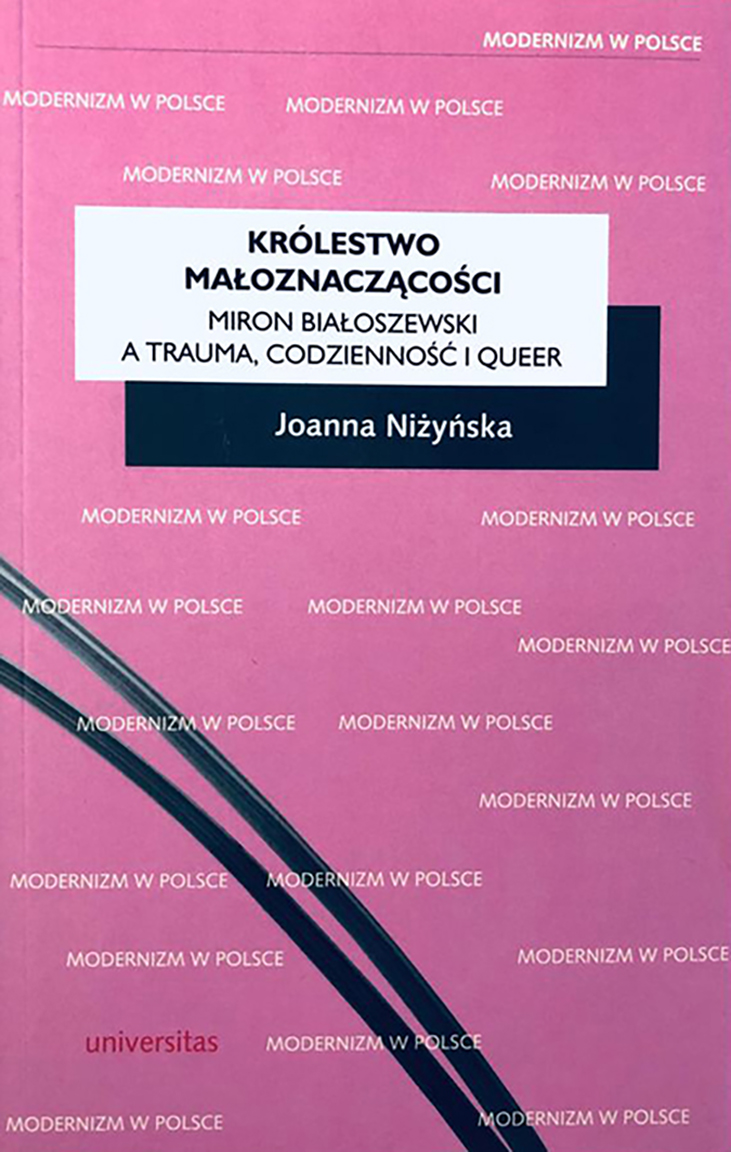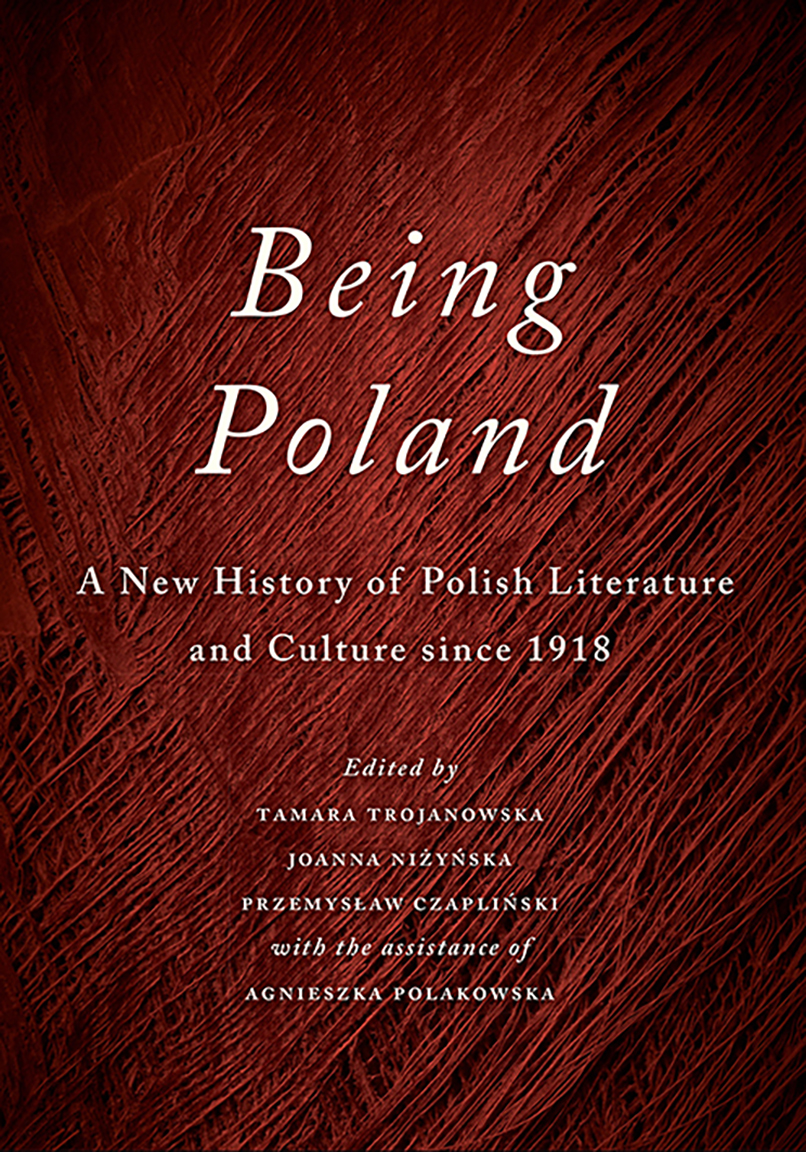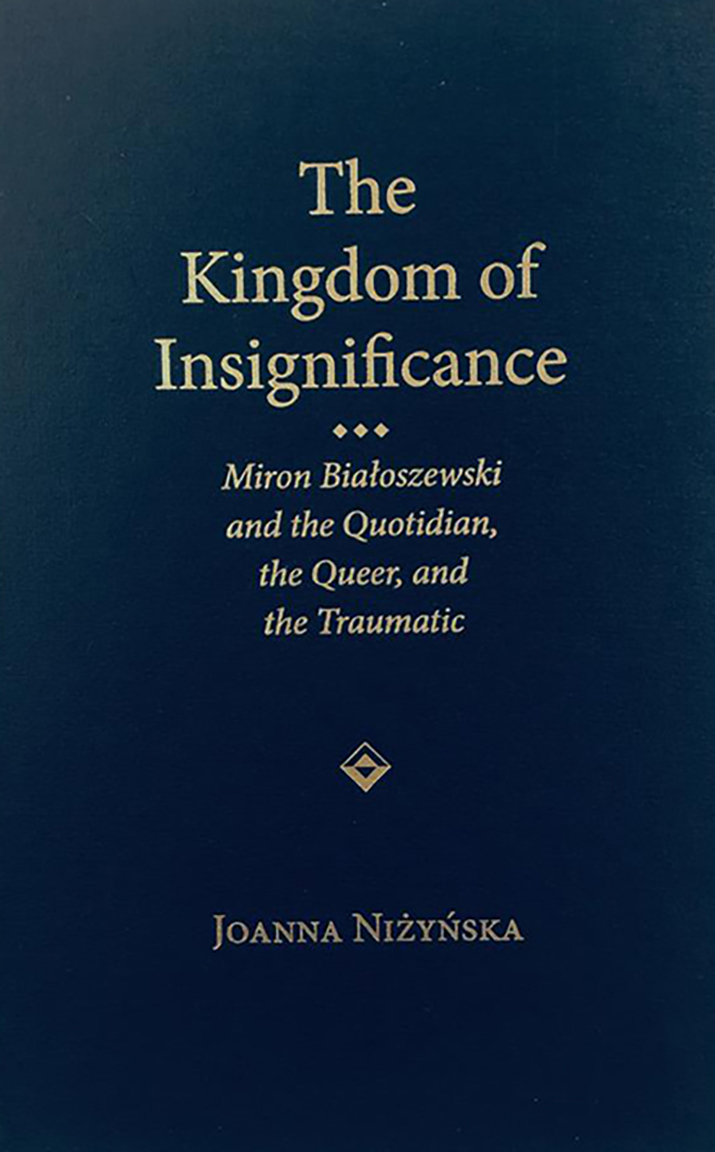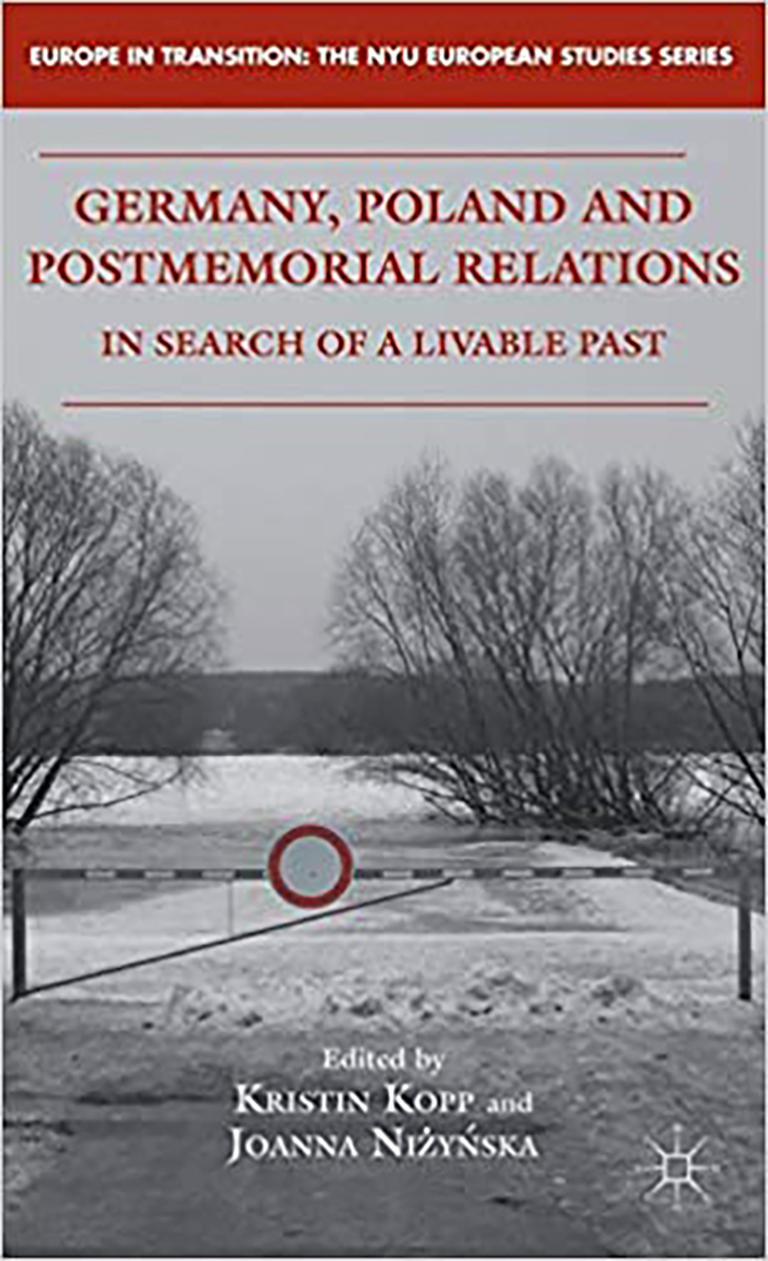- Ph.D., Comparative Literature, UCLA, 2002

Joanna Niżyńska
Associate Professor, Slavic and East European Languages and Cultures

Associate Professor, Slavic and East European Languages and Cultures
Return of the Jew: Polish-Jewish Memory Culture in Postcommunist Poland
comparative literature; Polish literature and culture; postcommunist cultural transformations; memory and trauma studies; Polish-Jewish memory culture; "glocalization" of "theory"; gender and queer studies; "minor" cultures and globalization
I approach the field of Polish Studies from a comparative perspective and engage in research that crosses disciplinary and national borders. In my first monograph, The Kingdom of Insignificance: Miron Białoszewski, and the Quotidian, the Traumatic, and the Queer (Northwestern UP, 2013; Polish translation Królestwo małoznaczącości: Miron Białoszewski a trauma, codzienność i queer, Universitas 2018), I explored the inscription of traumatic traces over everyday life and gender identity. Kingdom of Insignificance was the first book on Miron Białoszewski published in the US, and writing it made me aware of the challenges faced by scholars who need to bridge the gap between less-known cultures and the expectations of English-speaking audiences. My monograph accomplished this through the "lingua franca" of theoretical frameworks (of trauma, queer, and everyday studies) whose employment in turn necessitated an exploration of what happens when theory formulated in one cultural context is transplanted to another. The awareness gained in the process guided my editorial work on Being Poland: A New History of Polish Literature and Culture since 1918, an 800-page interdisciplinary volume with 60 contributions from a team of international scholars, written with English-speaking audiences in mind. My current book project investigates contemporary Poland's cultural memory from the perspective of the long-lasting imprints of the communist politics of memory, particularly as it pertains to the Polish-Jewish past. It builds on my previous projects on trauma and memory while taking advantage of a gained awareness of my own and my audience's cultural positioning.
I teach surveys of Polish literature and culture as well as courses on theories and themes including memory and trauma studies, post-1989 cultural transformations, and Polish-Jewish culture.

Joanna Niżyńska, Translated into Polish by Agnieszka Pokojska
2018

Edited by Tamara Trojanowska, Joanna Niżyńska, Przemysław Czapliński
2017

Joanna Niżyńska
2013

Edited by Kristin Kopp, Joanna Niżyńska
2012
Books
Being Poland: A New History of Polish Literature and Culture since 1918
Edited by Tamara Trojanowska, Joanna Niżyńska, and Przemysław Czapliński with the assistance from Agnieszka Polakowska (University of Toronto Press, 2018).
Winner of “Best Edited Multi-Author Scholarly Volume Award” from AATSEEL (American Association of Teachers of Slavic and East European Languages)
Królestwo małoznaczącości: Miron Białoszewski a trauma, codzienność i queer Joanna Niżyńska, translated into Polish by Agnieszka Pokojska (Kraków: Universitas, 2018)
Nominated for the "Best 2018 Book on Gender" award by Polish Gender Society
The Kingdom of Insignificance: Miron Białoszewski and the Quotidian, the Queer, and the Traumatic (Northwestern University Press, 2013)
Finalist for the “Jan Kochanowski Award” for the best book in Polish Studies published outside of Poland from 2012 to 2016 by International Association in Polish Studies
Germany, Poland and Postmemorial Relations: In Search of a Livable Past
Edited by Kristin Kopp and Joanna Niżyńska (Europe in Transition: The NYU European Studies Series, Palgrave Macmillan, 2012)
Selected articles and book chapters:
“Miron Białoszewski,” Online Encyclopedia of Literary Neo-Avant-Gardes, forthcoming spring 2022
“Translating Memory: The Reception of Miron Białoszewski’s A Memoir of the Warsaw Uprising in North America in The Routledge World Companion to Polish Literature, eds. Tomasz Bilczewski, Stanley Bill, and Magdalena Popiel (London: Routledge, 2022).
“Delectatio Morosa. Reflections on Affective Compensation, Conflation, and Fantasy in Polish Memory Culture” in After Memory: WWII in Contemporary Eastern European Literatures, eds. Matthias Schwartz, Nina Weller, Heike Winkel (Berlin: De Gruyter, 2021) [Modified reprint from “Delectatio Morosa, or Modes of Affective Compensation in Polish Memory Culture” from Being Poland: A New History of Polish Literature and Culture Since 1918].
"Tłumaczenie pamięci: Anglojęzyczna recepcja Pamiętnika z powstania warszawskiego Mirona Białoszewskiego"/ "English Language Reception of Miron Białoszewski's A Memoir of the Warsaw Uprising," in Światowa historia literatury polskiej. Interpretacje/A World History of Polish Literature: Interpretations, eds. Małgorzata Popiel and Tomasz Bilczewski (Cracow: Jagiellonian University Press, 2020).
"Delectatio Morosa, or Modes of Affective Compensation in Polish Memory Culture," in Being Poland: A New History of Polish Literature and Culture Since 1918, eds. Tamara Trojanowska, Joanna Niżyńska, and Przemysław Czapliński (University of Toronto Press, 2018).
"'Ex Pluribus Plures': Cultural Histories in the Twenty-First Century." Introduction to Being Poland: A New History of Polish Literature and Culture Since 1918, eds. Tamara Trojanowska, Joanna Niżyńska, and Przemysław Czapliński (University of Toronto Press, 2018).
"Pejzaż po katastrofie" (A Landscape after the Catastrophe) Tygodnik powszechny, July 1 2018 https://www.tygodnikpowszechny.pl/pejzaz-po-katastrofie-153585.
“Ameryka Barańczaka widziana stamtąd. Rozmowa” (Barańczak’s America from Within. A Conversation) in Ameryka Barańczaka, eds. Ewa Rajewska and Sylwia Karolak (Cracow: Universitas, 2018).
"Gender Is the Real Queer: Gender Wars in Contemporary Poland," in Father Figures and Gender Identities in Scandinavian and Comparative Literature: Studies in Honor of Ross Shideler, edited by Kathleen L. Komar (Berkeley, CA: North Pinehurst Press, 2016).
"Miron Białoszewski," The Literary Encyclopedia, first published July 11, 2016. http://www.litencyc.com/php/speople.php?rec=true&UID=13571
"Globalization and its Discontents: Notes on Polish Studies in an Age of Globalization," East European Politics and Societies, vol. 28.4 (2014).
"Zazdrość o centrum: Miłosz, Białoszewski i językowe zakorzenienie" ("Center Envy: Miłosz, Białoszewski, and the Desire for Linguistic Rootedness") in Warszawa Miłosza (Miłosz's Warsaw), ed. Marek Zaleski (Warsaw: Institute of Literary Research [IBL PAN], 2013).
"Between Entitlement and Reconciliation: Germany and Poland's Postmemory after 1989" in Germany, Poland and Postmemorial Relations: In Search of a Livable Past, eds. Kristin Kopp and Joanna Niżyńska (New York: Palgrave Macmillan, Europe in Transition: The NYU European Studies Series, 2012).
"The Something More of 'almost nothing': Miron Białoszewski's Kairotic Everyday,"
Interpretations: European Research Project for Poetics & Hermeneutics, vol. 4.5 (2011).
"The Politics of Mourning and the Crisis of Poland's Symbolic Language after April 10, 2010," East European Politics and Societies, vol. 24.4 (2010).
"Polish Literature Twenty Years After," East European Politics and Societies, vol. 23.4 (2009): 567–69. Special anniversary issue on Eastern Europe since 1989 ("East-Central European Literatures Twenty Years After" guest-edited by Michael Heim).
"Traumatyczny, codzienny, queer: 'Znaleziony list' Mirona Białoszewskiego" ("The Traumatic, the Everyday, and the Queer: Miron Białoszewski's 'Purloined Letter'") in (Nie)obecność: pominięcia i przemilczenia w narracjach XX wieku (Non-Presence: Gaps and Silences in 20th Century Polish Narrations, eds. Hanna Gosk and Bożena Karwowska (Warsaw: University of Warsaw Press, 2008).
"Impossibility of Shrugging One's Shoulders: O'Harists, O'Hara and Post-1989 Polish Poetry," Slavic Review: Journal of the American Association for the Advancement of Slavic Studies, vol. 66 (2007).
"Things Post-German: Stefan Chwin's Death in Danzig." Transitions Oan online scholarly journal covering post-communist countries. May 5, 2005.
"Marsyas' Howl: The Myth of Marsyas in Ovid's Metamorphoses and Zbigniew Herbert's 'Apollo and Marsyas.'" Comparative Literature: Journal of the American Comparative Literature Association, vol. 53 (2001).